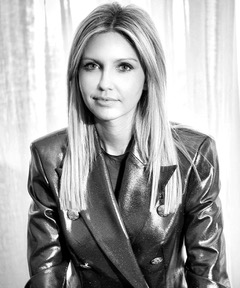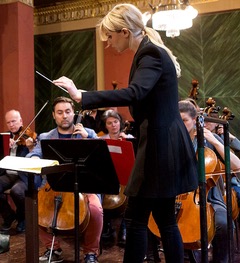VANESSA BENELLI MOSELL: FURTHER DEVELOPMENTS
 In an earlier interview under the titel Allround Pianist’ from around 2013 we talked about te start of your career. Now let’s look at further developments.
In an earlier interview under the titel Allround Pianist’ from around 2013 we talked about te start of your career. Now let’s look at further developments.How important was it for you to be contracted by Decca and when exactly was this?
They have been wonderful with me since the beginning. I am grateful to them because they let me start with a project around Stockhausen in 2015, and that was our first contract. We are making a musical path together year after year, reflecting myself in each of our projects.
Did they give you a free choice of the repertoire you wanted to play?
Yes, absolutely…We both think a project should come from an artist’s creative mind.
You studied with Stockhausen, so it was logical to start with his Klavierstücke, written between 1952 and 1961. What make these ‘drawings’ so interesting for you?
To me they are very precious pages. It’s their pureness yet their complexity to fascinate me, I think…Stockhausen have kept changing and evolving so intensely after those years, that the first ‘Klavierstücke’ represent to me a kind of biblical nascent state.
In 2014 you started with recording the Klavierstücke of Stockhausen. Did you study them together with him. Did it help you much?
Having received his suggestions about them, they inspired me to somehow “engrave” my interpretation. It was essential for me to meet him and study with him in order to be able to do it.
Why did you omit the two longest, the monumental no. 6 and 13 (both more than 20 minutes long), Only because they didn’t fit on one CD?
I just respected Stockhausen’s conception idea. Stockhausen grouped the first four ‘Klavierstücke’, then the fifth, the seventh and the eighth, being aestethically close, and the ninth representing the beginning of a new life.
A project of recording the other ‘Klavierstücke’ was expected from the beginning…
In 2015 you made it partly good by adding the 3-part no. 12, drawn from Donnerstag aus Licht, taking about twenty minutes. What was the special challenge here? That you had to add shouts, clicks and whistles?
Yes, that’s quite a challenge. But the most important is to remember that this an operatic piece. So these effects are never finalised to themselves, but to the expressivity of the musical plot.
You then added the 24 Preludes op. 11 of Scriabin. What made them a logical companion?
Stockhausen and Scriabin shared so much in common. Above all the ambition in changing the world with their music. For them it’s not just making music, or composing a new piece of music. It’s about a total work of art, that after listening to it nothing will be the same as before.
May we expect no. 6 some time later? Would be nice for a compilation of all 12 on 2 cd’s.
He wrote 14! Who knows. Maybe…as I mentioned above everybody is expecting them, but in the meantime there are so many other interesting things for me to discover…
What is so special about no. 9 with its 139 times obsessively repeated opening chord? How do you differentiate in this sort of minimal music?
Well, to me this music isn’t really minimal, because there is no repetitions. Even if a chord is repeated I can talk about minimalism here. There is so much going on in this piece, that the beginning is probably the less interesting part, yet it is very interesting!
Are you proud that your performances generally are considered as the best?
What makes Karol Beffa’s Suite so interesting for you?I found it rather boring?
Many people find Karol Beffa’s music boring and way more people find Stockhausen’s music boring. I have to respect all points of view. I am not here to judge the music, I am here to bring the best out of it. Beffa’s Suite in the (R)evolution album was a juxtaposition of ‘Petrushka’ and I find it a quite well written representation of the new-melodic contemporary wave that have been endorsed by Stravinsky at a certain point of his life and a very effectual piece for audiences. It was also obviously in objection to Stockhausen’s music, but I am not a good politician.
Did you ever consider to make a recording op Alkan’s Pianoworks?
No I haven’t honestly.
Then in 2016 Rachmaninov 2 and the Corellivariations followed. You didn’t make a showcase of these compositions, but why make a recording of them for an already overcrowded market? Did you have anything special and personal to express?
We cannot expect people to listen to the same recordings endlessly for the next thousand or more years I guess. That would be incredibly boring to me. I think each artist bring something new to any piece. The history of interpretation will evolve and will go ahead as it should be.
A year later the Debussy Préludes book 1 and the Suite bergamasque were the subject of your next enterprise. You succeed very well again in throwing out the technical fireworks and delivering harmonies with a firmness of touch. Can you explain how do manage that?
I was very inspired, I guess that’s it. I don’t know how I manage, maybe that what it is…I don’t manage, it just happens.
As a kind of dodge came the Beethoven and Hummel works for mandoline and piano with extra’s from Apparailly, Kreisler and Murphy/Fontaine this time for Naïve. Who took the initiative? Did you enjoy these works?
I must admit the initiative came by wonderful colleague Julien Martineau. He did all the work of research, of discovery and assembled together an interesting program. I really enjoy playing this music. I think Beethoven mandolin and piano pieces are undiscovered musical treasures that deserve to be more played as well as the Hummel Sonata, which is such a masterwork. I was ashamed of myself I ignored the existence of it before. Thanks t o this project I had the opportunity to grow in this direction.
o this project I had the opportunity to grow in this direction.
 o this project I had the opportunity to grow in this direction.
o this project I had the opportunity to grow in this direction. Your latest recoding is Ravel, his Pianoconcerto in G and the Pavane and Tombeau de Couperin. What is the special attraction of these works for you?
I have some connection with Ravel. I feel something special with these pieces. I can’t explain…it’s probably linked to my childhood. Ravel can be so simple, childish, playful, yet direct, or artificial in the highest sense of the word. It was fun to explore myself in these terms.
Why not make te usual combination with the Left had concert? May we aspect that in near future?
I don’t like to repeat things that have been done in the same order. I like to do things differently. It’s part of my personality.
And there came the program Casta diva with arrangements of more or less well-known operafragments. Was the idea yours?
Of course. I have this idea since long time.
You motivated it with the remark: “I went to see my first opera Boris Godunov at the age of 3 in Florence and was transfixed by the children’s choir of the Teatro del Maggio Musicale Fiorentino. At five, I joined them entering the world of the theatre, performing, rehearsing and living with a pantheon of opera stars and conductors such as Semyon Bychkov, Riccardo Chailly and Zubin Mehta. It was inspirational and it is utterly wonderful to return to this world of opera through the prism of the piano. It is my dream one way to be able to conduct these great operas as well.”
Were you happy with the result? What reactions did you get?
I am very happy with the result, and couldn’t be more proud of it. I am getting enthusiastic reactions daily. This album will stay.
I saw you studied conducting with Luca Pfaff in Strasbourg and won awards during festivals in Elba and Pietrasanta, worked with the Vienna Chamber orchestra and the Divertimento Ensemble in Milan. Were you easily accepted as ‘the boss’ in conservative Vienna? I remember Krystian Zimmerman telling me that he had difficulties with the Vienna Philharmonic in completing the recording of the Beethovenconcerts after the dead of Leonard Bernstein.
We do realise that our musicians’ generation mostly are moved to study and develop abroad from wherever to wherever and develop in several directions. So there isn’t such a pointless tradition of being a “viennese” anymore. I don’t like categorisation in music, it feels like racism to me and we shall stop conservatism. Art and artists together are the only ones that can make a changement. If we aren’t united we won’t succeed.
Somewhere you told that you wanted to specialise in music of our time from Gorge Benjamin, Hugues Dufourt, Stefano Gervasioni, Martin Matalon and Marco Stroppa. Do the impresario’s and concert organisations give you enough leeway to do so?
Actually those were opportunities I got from my impresarios who are totally endorsing my will.
Do you remember that you played in the Amsterdam Muziekgebouw? And the reactions you got?
Of course, it is an amazing hall. I played there again one year ago, during the Stockhausen retrospective in June. I always get enthusiastic reactions from the Dutch audience. I guess it is a mutual feeling. I remember making Stockhausen no. 12 with the full collaboration of the technical team at the Muziekgebouw in providing the right lights, sound space and one or two smoke machines…it was fun.
How handicapped are you by the Coronacrisis? No recitals, no concerts, no recordings?
I have been quite handicapped like a few thousands or more soloists. I feel we are all united to make culture becoming a priority in our societies all over the world, and to let our voice be heard by the politicians. Nevertheless I still could make the recording of Casta Diva this summer.
Luckily I have always too much work to do, and feeling almost overload with the many projects I have in plan for the future…
How you use this lost time? By studying new repertoire? Preparing a next recording? Can you tell already what you prefer to be on it?
At the moment I am preparing the Clara Schumann Concerto to play in January, with Orchestre Philharmonique de Radio France conducted by Mikko Franck. I am also preparing a few symphonies of Beethoven and Shostakovich to conduct always in January, so I feel I almost don’t have free time.

